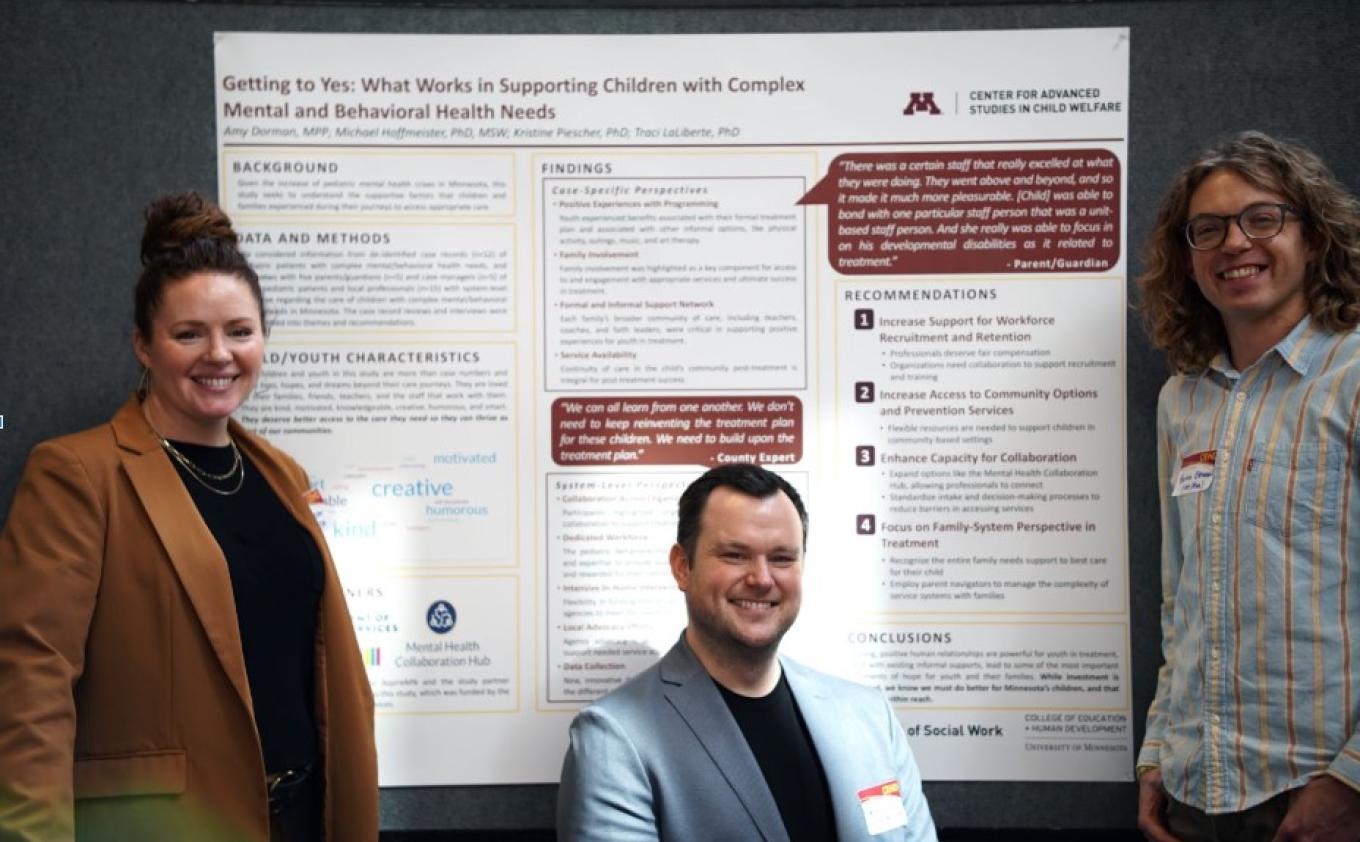News

UMN's Minn-LInK data offers researchers new insights in child welfare
The Minnesota Linking Information for Kids (Minn-LInK) project was created in 2003 and is housed at the Multidisciplinary Institute for Child Welfare, located in the School of Social Work at the University of Minnesota. The program was developed to coordinate care for the most vulnerable children and families across multiple social service systems.
For more than twenty years, the Minn-LInK project has provided researchers, practitioners, educators, administrators, and policymakers rare insights into the experiences of children and families served by multiple systems. Minn-LInK connects longitudinal data from multiple systems providing answers to questions about the effects of policies, programs, and practice on the well-being of children and families in Minnesota.
Research teams can use Minn-LInK to access integrated, administrative data from various state and local agencies in Minnesota. These data sources provide a rich and more comprehensive way of assessing outcomes, such as:
- Parent and child disability identified through Individualized Education Plans (IEPs)
- Involvement in the child welfare system, including confirmed child protection cases and out-of-home placements
- Participation in public assistance programs like the Minnesota Family Investment Program (MFIP) and Supplemental Nutrition Assistance Program (SNAP)
- Experiences of housing instability or homelessness
- Contact with the juvenile justice system
- Education outcomes such as school attendance, reading and math achievement, and graduation rates
Minn-LInK supports researchers in answering critical questions around the interconnectedness of involvement with multiple systems, risk factors for adverse child and family outcomes, and disproportionality and disparities regarding race/ethnicity, gender, disability, and other intersecting identities.
The types of data housed by Minn-LInK include:
- Student Academic Records
- Standardized Test Records
- Academic Disciplinary Records
- General Education Testing Records
- Child Protection Records
- Children’s Mental Health Records
- Records of Incarcerated Adults
- Juvenile Court Records*
- Academic Disciplinary Records*
- Other Human Services Data*
Data sets are also available upon request.
The data that Minn-LInk brings together includes student academic records, academic disciplinary records, standardized test records, and general education testing records from the Minnesota Department of Education; child protection records, children’s mental health records, and records of other human service systems from the Minnesota Department of Children, Youth, and Families; records of incarcerated adults from the Minnesota Department of Corrections; and juvenile court records from the Minnesota State Court Administrators Office.
To ensure that child welfare and other affiliated professionals have access to the latest available research from experts, informed by the most recent available data sources, the Center for Advanced Studies in Child Welfare (CASCW) Research and Evaluation Team regularly develops Minn-LInK Briefs and correlating discussion guides.
Some recent examples include:
- Intersections of Housing Insecurity and Disability Among Minnesota’s K-12 Students
- Social Determinants of Health and Educational Outcomes Among Children With Multi-System Involvement
“These briefs, and the research behind them, are developed through partnerships between the CASCW Research and Evaluation team and universities, nonprofits, and government agencies,” said Minn-LInK’s Director of Research and Evaluation, Dr. Michael Hoffmeister, “By pooling our collective knowledge, skills, and resources, we can now answer some of the most pressing and complex issues impacting child welfare.”
Research Partnerships: Bridging Knowledge and Community
The Research and Evaluation Team at CASCW act as stewards of Minn-LInk data, and strive to connect different experts and organizations to research complex issues impacting child welfare. In doing so, these organizations are able to achieve a variety of research goals more effectively than any single organization could on its own.
“Child welfare research is complex because it must address a broad array of factors, adapt to changing conditions, and navigate ethical and policy considerations,”said Minn-LInK founder and CASCW’s Assistant Executive Director, Dr. Kristine Piescher, “Successful research requires a nuanced approach that considers all of these elements to improve the well-being of children and families.”
The Getting to Yes study, conducted in collaboration with AspireMN and the Minnesota Department of Human Services, sought insights into the growing number of pediatric mental health crises in Minnesota.
Researchers at CASCW led this study to better understand what helps children with complex mental or behavioral health needs—and their families—navigate the care system, especially given the persistent challenges in accessing longer-term care settings, such as hospital emergency departments.
Using a qualitative approach, the study included analysis of Minn-LInK data, including de-identified case records, interviews with parents or guardians of pediatric patients with significant mental or behavioral health needs, and focus groups with staff who work directly with this population.
Are you interested in learning more about Minn-LInK or a research partnership with CASCW?
Please reach out to Michael Hoffmeister, Director of Research and Evaluation at CASCW.
Learn more about Minn-LInk data and opportunities for researchers: